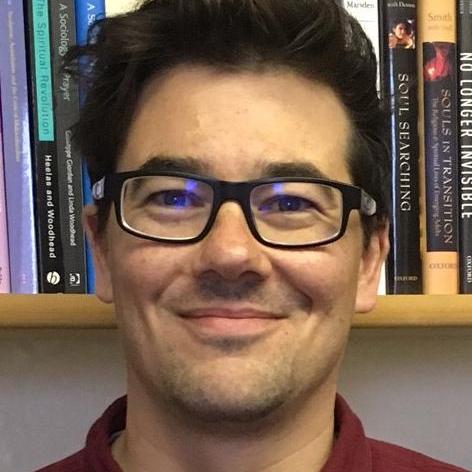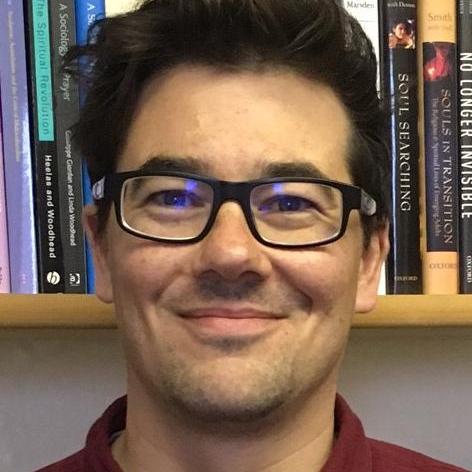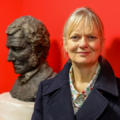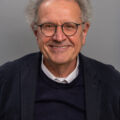Economy, society, and religion: Revisiting Max Weber with Mathew Guest
Economy, society, and religion: Revisiting Max Weber with Mathew Guest
In an interview with the European Academy on Religion and Society (EARS), Professor Mathew Guest, a scholar of the sociology of religion at Durham University, explores the future of religion against the backdrop of economic and social changes. Moving away from Max Weber’s notion that religious life shapes economic systems, he suggests that neoliberalism significantly reshapes religious identity and practice. Guest critiques meritocracy for overlooking structural inequalities and reflects on religion’s ambiguous role in social unity and division. He concludes by calling for careful ethical consideration in examining the interplay between religion and the economy today, pointing out the complex role religion may play in the future.
The interplay between economic structures, social dynamics, and religion is a topic of enduring interest and ongoing study. In an interview with the European Academy on Religion and Society (EARS), Professor Mathew Guest, a distinguished scholar in the sociology of religion, explores the relationship between these factors and what it means for the future of religion. Currently, he is the Head of the Department of Theology and Religion at Durham University. He is also the chair of the British Sociological Association’s Religion Study Group (SocRel), and his research emphasises the importance of studying religion as a lived phenomenon.
In this interview, Professor Guest brings his extensive expertise to discuss Max Weber’s enduring legacy and the interplay of religious and economic forces shaping the present and future of contemporary society. He, therefore, offers a rich interdisciplinary perspective on the evolving role of religion in a rapidly changing world.
Weber’s legacy in the 21st century
In his exploration of economy, society, and religion, Guest echoes the foundational ideas of Max Weber, a German sociologist known for his theory linking Protestant ethics with the spirit of capitalism. Weber argued that the values of hard work and frugality, emphasised in Protestantism, particularly Calvinism, significantly influenced the development of capitalism in the West. This intersection of religion and economics forms a cornerstone of Weber’s broader analysis of society and culture. While considering neoliberalism and religion, Guest resonates with Weber’s examination of these themes. However, Guest is keen to point out, “Weber’s argument is really about the correlation between the ways of thinking and acting found amongst certain kinds of Protestants, which align with capitalist endeavours.” He identifies a shift in perspective, noting that Weber’s analysis of capitalism as emerging from Protestant Christianity seems “a bit uncertain or difficult to sustain” when considering the diverse origins of capitalist practices and the varied expressions of Protestant Christianity that do not align with Weber’s model.
Where Weber emphasised the ‘spirit’ of capitalism as an ethos emerging from religious life, Guest extends this concept. He examines how neoliberal economic forces influence religious identities and practices. Guest contends that it is the cultural influence of neoliberal economics on religion, rather than religion’s shaping of economic systems, that marks contemporary society. He articulates this relationship, saying, “It’s that set of assumptions that I’m most interested in; how they find their way into broader spheres of cultural experience in various parts of the world and come to shape what we understand to be meaningful or successful religious practice.” Guest notes that his book, Neoliberal Religion: Faith and Power in the 21st Century (2022), was developed out of a long-standing interest in how Evangelical Christianity draws on the language, resources, ideas, and methods that we more commonly associate with private business and market economies.
Despite critiquing its direct applicability to today’s socioeconomic context, Guest acknowledges the historical significance of Weber’s work. He notes, “Whether you read Weber as enduringly relevant or as out of date depends on what status you attribute to the argument.” Guest sees Weber’s work as “useful to think with,” suggesting that the subtlety and complexity of Weber’s thought process are more valuable than the specifics of his conclusions. This perspective promotes an engagement with Weber’s work that is reflective, not prescriptive—an approach that seems fitting given the current interplay between religion and economics.
“Whether you read Weber as enduringly relevant or as out of date depends on what status you attribute to the argument.”
The future of religion
Guest, like Weber, does agree that religion has a definite relationship with economic and social forces. He observes that the assumption that religion is a mark of societies lagging in modernisation has been subverted in recent decades. As Guest notes, the intersection of religion with neoliberal economics is particularly telling. The trend of religious identities adapting to the pro-market economy, which espouses notions of commodification and individualism, is becoming increasingly prevalent. This evolution mirrors what Guest identifies as the “elective affinity” between economics and religion—a synergy Max Weber keenly recognised in his seminal work.
In the context of future trends, Guest acknowledges a complexity that Weber’s early 20th-century perspective could not have foreseen. The binding of religious interests with political ones, especially in the form of populist politics, underscores a different kind of cooperation between religion and economics. In this scenario, religion becomes a tool not just for spiritual or cultural expression, but as a strategic instrument in the hands of powerful leaders. These leaders do not simply emerge as responsive to the collective will of their followers; instead, they actively create and shape their base of followers through the manipulation of religious narratives and symbols. This reversal of the traditional leader-follower dynamic signifies a significant shift from Weber’s analysis. “It’s possible for religion to play an extremely influential and important role in societies across the globe when it’s used in particular ways by powerful individuals,” suggests Guest. In this modern context, individual leaders play a key role in directing social trends and decisions, leveraging religion to mould public opinion, legitimise political agendas, and influence national identity. This phenomenon reflects a new leadership model, where individuals do not merely reflect societal changes but actively use religion to direct and shape these changes.
Therefore, religion’s future is closely tied to political, economic, and cultural forces. Guest observes, “It’s complicated, but it’s not incidental that many of these populist figures are also very pro-market and very keen on downplaying the role of the state and heightening the role of the private sector within their respective contexts.” The rise of populist politics, attached to religious identities, underscores religion’s potent role in shaping societies. This role challenges earlier scholarly predictions of religion’s wane in the face of technological and capitalistic progress.
“It’s possible for religion to play an extremely influential and important role in societies across the globe when it’s used in particular ways by powerful individuals.”
The ambiguous role of religion
Meritocracy’s role in social outcomes further complicates religion’s future, a theme Guest expands on in his exploration of religion’s role in societies. Reflecting on the intersection between religion, competition, and meritocracy, Guest addresses the role of meritocracy, which Weber might have seen as part of the capitalist spirit. Guest sees it as problematic, particularly when it obscures systemic inequalities, arguing, “It’s deeply concerning from a political and moral perspective.” This critique reflects a broader concern with how religious and economic ideologies may reinforce individualistic values at the expense of social equity. Building again on Weber, Guest argues that “the idea of life being governed by individual decisions, with rewards based on merit, fails to account for the structural inequalities framing the broader picture.”
Yet, the question remains whether religion can be a force for bridging the widening economic gaps. Guest observes religion’s dual role in generating both social divisions and unity: “Religion is very capable of working in both directions … it depends on the actions of individuals and their harnessing of power whether they work for the good of their communities or whether they align themselves with interests that are working in the opposite direction.” Guest emphasises the importance of institutions and their potential as engines for positive change, while also recognising the challenges they face in the current climate. He reflects, “It’s very difficult in the current global climate to see religious institutions in a positive light without considering them as profoundly flawed mechanisms for exploitation and abuse.” To emphasise his overall point, Guest returns to the recent rise of populist politics. He refers specifically to the cases of Geert Wilders in the Netherlands and the political climate in Argentina, where religious concerns are manipulated to garner support from a discontented electorate. These examples underscore religion’s dual role in dividing and uniting societies, depending on how powerful individuals wield it.
“Religion is very capable of working in both directions … it depends on the actions of individuals and their harnessing of power whether they work for the good of their communities or whether they align themselves with interests that are working in the opposite direction.”
Guest suggests that policymakers and community leaders should be vigilant about the ethical dimensions of religion’s economic and social ambiguity. “Once you consider the alignments between religious interests and economic interests, between neoliberal assumptions and religious causes, then you inevitably encounter so many examples of inequalities of power, abuse of power, and marginalisation of the impoverished.” This perspective underlines the necessity of an ethical analysis of religion that accounts for its influence on power distribution and societal structures, as he himself emphasises, “The sociology of religion, once it takes seriously the broader neoliberal context, has to be an ethical as well as an analytical endeavour.” Guest’s perspective, therefore, not only describes but confronts the power relations and ethical challenges prevalent in the interactions between religion, economics, and society.
“The sociology of religion, once it takes seriously the broader neoliberal context, has to be an ethical as well as an analytical endeavour.”
A future without institutions
Looking ahead, Guest contemplates the uncertain future of religion in Europe and beyond. He states, “It’s very difficult. I’m a firm believer in institutions and I believe that that’s how societies can progress and enable opportunities to be sustained and developed for people.” Similar to Weber, this reflects his belief in the value of institutions as catalysts for societal progress and opportunity.
Guest, however, suggests we might need to look beyond traditional Western societies or towards non-institutional forms. He elaborates, “We might also be looking at non-institutional forms of religion as those that thrive the most. I don’t know what that would look like, but the influence of online communication, the flow of influence from the West into the global South, the uneven distribution of economic opportunity across the world, and the role of religion in populist regimes like the Philippines and Africa, all adds up to a recipe of rather unpredictable consequences.” As before, Guest’s emphasis on how religious identities and practices are now influenced by neoliberal economic forces challenges Weber’s legacy that economic life emerges from religious life.
“We might also be looking at non-institutional forms of religion as those that thrive the most.”
Reflecting on these possibilities, Guest is cautiously optimistic yet realistic. He speculates, “I don’t know what will happen, but I don’t think it will look very much like what we’ve seen in the past.” However, he warns of a possible cynical future where religious institutions might continue to hold power despite their flaws, confronting a growing population of disillusioned secularists. He admits, “I wouldn’t want to see that, but it’s quite possible.”
Who is Mathew Guest?

An accessible and influential voice in his field, Guest has significantly contributed to understanding the role of religion in modern contexts, particularly in higher education. His involvement in the groundbreaking ‘Christianity and the University Experience in Contemporary England’ project, the first empirically driven nationwide study of student Christianity in the UK, led to the publication of Christianity and the University Experience: Understanding Student Faith (2013). He has published significant works on economics, society, and religion. His book Neoliberal Religion: Faith and Power in the Twenty-first Century (2022) notably focuses on how neoliberal cultural developments have transformed religious expressions.
This interview was conducted by Muhammad Faisal Khalil and Simone Kroes.
Explore the interview series on the future of religion:
- Religious orthodoxy and the future of religion: A conversation with Philippe Portier
- Through the apocalypse: Graham Ward on religion’s future in the wake of migration
- Completing our reality: Bénédicte Lemmelijn on women shaping tomorrow’s religion
- Tradition in transition: Linda Woodhead on women’s roles in the paradoxical religion of tomorrow
- Religion at a crossroads: A conversation with Matthias Smalbrugge on the future of religion





